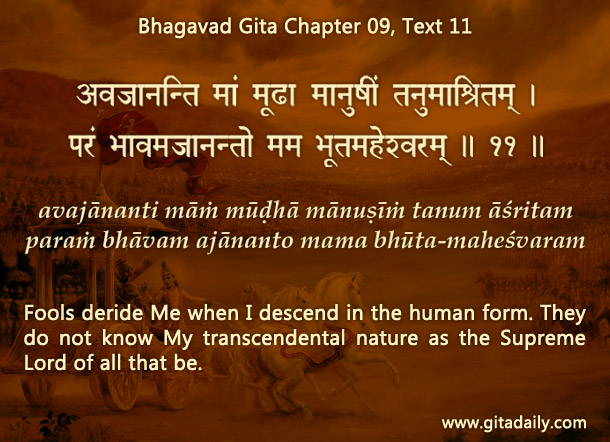
The sun is self-luminous, yet those who are under a cloud can’t see it.
The words of the Bhagavad-gita, especially its repeated proclamations of the supreme transcendence of Krishna (07.07, 09.10, 10.08, 10.13, 15.19, for example), are like the sun they are self-evident. Yet the self-evident is not evident to us due to the cloud of misconception.
Unlike the cloud in the sky, the inner cloud is of our own making. Based on our karmic choices and the attendant consequences, we get conditioned to particular patterns of thinking. These patterns stem from a set of often-unexamined assumptions that filter whatever we perceive to reinforce those assumptions.
One such distorting assumption is that all of reality is similar to the reality we have experience of. When we apply the filter of this assumption on Krishna, we commit the blunder of anthropomorphism: we ascribe to God the form (morpho) that we humans (anthropos) have experience of. We misperceive that Krishna’s form is just like our form flawed, finite, fallible.
Though we have made this cloud, Krishna is ready to help us unmake it through wisdom and purification.
Wisdom: The Gita (09.11) enlightens us about the pitfall of anthropomorphism. Then its eleventh chapter display of Krishna’s universal form demonstrates dramatically how his potency is infinitely greater than ours.
Purification: Just as the sun can dissipate the cloud, Krishna can purify us of misconception. But we need to let the sunlight fall on the cloud, that is, we need to let the sun-like wisdom of the Gita, which culminates in the sweet beauty of Krishna, fall on our mind and intelligence the location of the cloud. When we humbly and prayerfully cultivate remembrance of Krishna, awareness of his supreme potency and personality dawns progressively in our heart, and attracts us to him forever.


Hare Krishna.
Very enlighting article.In order to understand Krishna, His unconcivable beauty and His infinite potencies we have to rise above the level of material nature and rise to the level of Krishna consciousness and bhaktiyoga.
Thank you very much.
Wonderful and clear explanation sir. So whatever position one may be, or whoever one is, everyone can realise and understand krishna as the supreme transcendental personality of the godhead, the knowledge about krishna can immediately destroy the ignorance and foolishness of the so-called fools and miscreants, then the entire human race will be blessed and will find the meaning of the life and the path to the kingdom of krishna in the spiritual world.